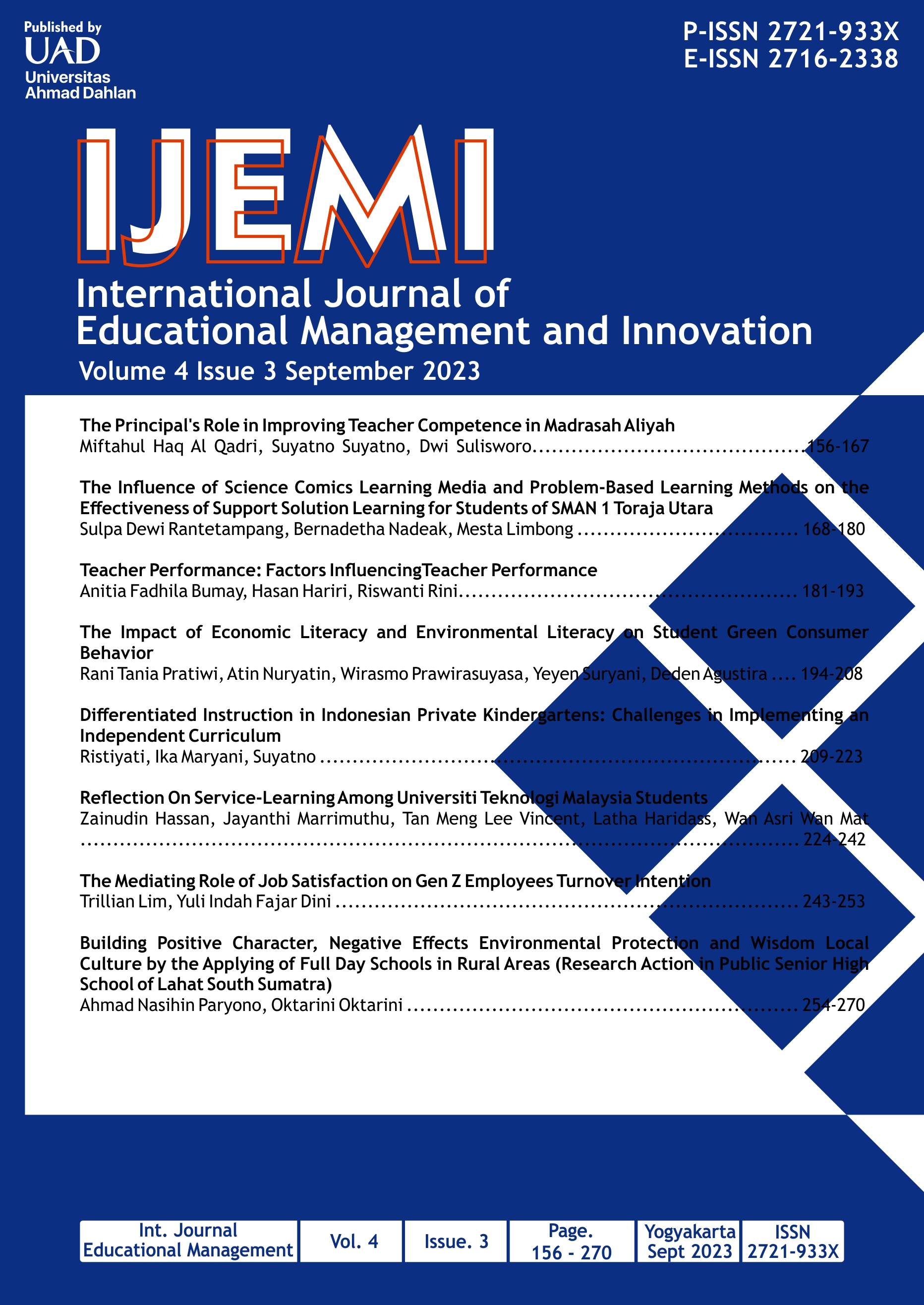Building Positive Character, Negative Effects Environmental Protection and Wisdom Local Culture by the Applying of Full Day Schools in Rural Areas (Research Action in Public Senior High School of Lahat South Sumatra)
DOI:
https://doi.org/10.12928/ijemi.v4i3.7990Keywords:
Full-Day School (FDS), Positive character, Negative effect , Wisdom local culture, Enviromental protectionAbstract
Many schools in the city choose Full Day (FDS) but for schools in rural still in very little in the list to apply this. The research was action research of discovering whether increased positive impact in the positive character, security environment wisdom exposed to negative and local culture can be accomplished by applying the Full Day School program. This research aims to find the effect of applying rural FS at the school. The research results show that the first Full Day school (FDS) in a rural area school can maximize time to communicate with students to build good character, such as religious, social,l and environmental care to students. Secondly, FDS in rural school areas can protect students from bad effects outside the school environment, negatively influencing drug users, environment-free sex, bad motorcycle groups, etc. Third, FDS gives students enough opportunity to learn about local culture with family and society about local culture. They can have time with their families from morning till noon on Saturday and Sunday, which would improve their knowledge of local culture and family activities. It can be concluded that FDS in rural school areas positively affects building positive and good student character. It is recommended that it be applied in other schools.
Downloads
Published
How to Cite
Issue
Section
License
Copyright (c) 2023 Ahmad Nasihin Paryono, Oktarini Oktarini

This work is licensed under a Creative Commons Attribution-ShareAlike 4.0 International License.
The copyright to this article is transferred to Universitas Ahmad Dahlan (UAD) if and when the article is accepted for publication. The undersigned hereby transfers any rights in and to the paper including without limitation all copyrights to UAD. The undersigned hereby represents and warrants that the paper is original and that he/she is the author of the paper, except for material that is identified as to its source, with permission notices from the copyright owners where required. The undersigned represents that he/she has the power and authority to make and execute this assignment.
We declare that:
This paper has not been published in the same form elsewhere.
It will not be submitted anywhere else for publication before acceptance/rejection by this Journal.
Copyright permission is obtained for materials published elsewhere and which require this permission for reproduction.
Furthermore, I/We hereby transfer the unlimited rights of publication of the above-mentioned paper in whole to UAD. The copyright transfer covers the exclusive right to reproduce and distribute the article, including reprints, translations, photographic reproductions, microform, electronic form (offline, online), or any other reproductions of similar nature.
The corresponding author signs for and accepts responsibility for releasing this material on behalf of any and all co-authors. This agreement is to be signed by at least one of the authors who have obtained the assent of the co-author(s) where applicable. After submission of this agreement signed by the corresponding author, changes of authorship or in the order of the authors listed will not be accepted.
Retained Rights/Terms and Conditions
Authors retain all proprietary rights in any process, procedure, or article of manufacture described in the Work.
Authors may reproduce or authorize others to reproduce the Work or derivative works for the authors' personal use or for company use, provided that the source and the UAD copyright notice are indicated, the copies are not used in any way that implies UAD endorsement of a product or service of any employer, and the copies themselves are not offered for sale.
Although authors are permitted to re-use all or portions of the Work in other works, this does not include granting third-party requests for reprinting, republishing, or other types of re-use.





